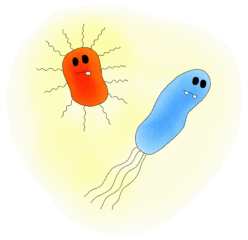The two methods of germ prevention
Germ prevention means to prevent harmful bacteria, viruses, fungi and protozoa from spreading and infecting you. It can be achieved in various ways. The most important methods for germ prevention are:
- Behaving in a way that minimises the risk of spreading germs and of getting infected by them.
- Training your body to be able to successfully fight off germs.
What do I mean by that? Let’s see below.
The right behaviour for effective germ prevention
Germs can be spread from one person to another, from touching material, animals or plants contaminated with germs, from eating contaminated food or drinking germ-infested water. Consequently, one approach to prevent germs from spreading and from infecting you is to behave in a way that makes it harder for them to do so. You can help yourself and others from being affected by bad bacteria, viruses and other microscopic critters by taking the following simple measures:
Brush your teeth!
Brush your teeth regularly and thoroughly. Also, brush your tongue. Change your toothbrush at regular intervals. It would also help greatly to use dental floss and mouthwash. And visit your dentist regularly. This will prevent tooth decay, a bad smell and a couple of other problems.
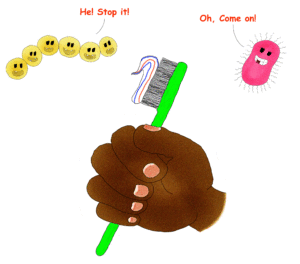
Wash your hands and your body!
Wash your hands thoroughly whenever they are visibly dirty when you have touched an animal, after you’ve been to the toilet, and before you prepare food, or have a meal. Rub them against each other and use soap.
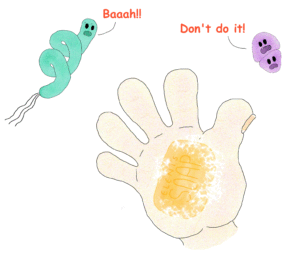
Take a bath or shower before you get smelly, or when you are grubby. But never go swimming or bathing in a pond, lake or river in an area that is known to be infested with harmful viruses, bacteria, protozoa or fungi.
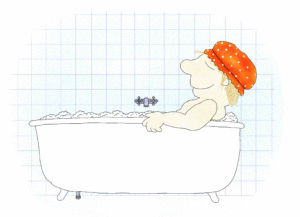
Cough and sneeze properly!
If you need to cough or sneeze, don’t do it into your bare hand. It is best to sneeze into a paper tissue and to throw it away afterward. If you don’t have a tissue at hand, sneeze into your elbow. When you are outside a building and not near any other people you can also sneeze on the ground.

In case you forget and do sneeze into your hand, make sure you wash it afterward with soap. Imagine that: Scientists have discovered that some bacteria can spread up to 13 foot and remain alive in the air for up to 45 minutes after being coughed or sneezed. Viruses can travel even further when propelled by a sneeze.
Watch what you eat and drink!
Don’t drink dirty water. If in doubt, better drink bottled water. Don’t eat food that tastes or smells bad.
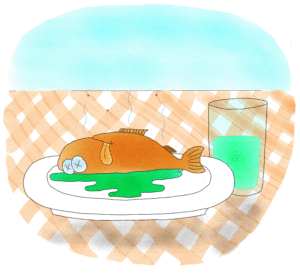
Treat your wounds properly!
If you hurt yourself and incur a bleeding wound, let the blood flow out a little bit. Then cleanse the wound with disinfectant and do not let it get dirty again. Of course, if it is a bigger wound, you will need to go to a medical doctor.
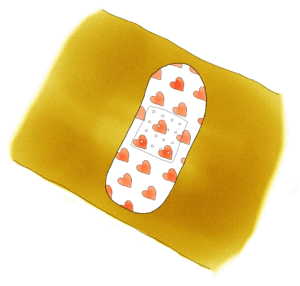
Keep away from infected people if you can and use the measures described above if you need to deal with anyone infected.
And that’s about it. If you follow all these suggestions, you will have greatly reduced your risk to get ill from bad bacteria, viruses, fungi or protozoa.
Then there is a way to train your body to become a more effective germ fighter.
Your body, a germ prevention fortress.
Did you know that your body is harbouring its own defensive army to deal with germs? This army is called the immune system. It consists of cells that can gobble up germs or produce weapons targeted against germs, such as so-called Bactericidal/Permeability-increasing proteins (BPIP) and antibodies. Other cells provide support functions for activating and boosting the primary immune defence cells.
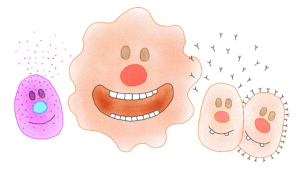
We are fighting for your health!
If you have a strong immune system you have a much better chance to keep germs at bay. And the good news is that there are ways to train your immune system. You can do general training to make it stronger. You also can get some specific training for your immune system to fight against one or more particular germs.
How to train your immune system
As for the general strengthening of your immune system it is recommended especially for kids to play in the mud and sand, stroke animals and play with other kids as often as possible. Do not be afraid to get dirty. Just wash afterwards.
To train your immune system against specific bacteria and viruses you will need to get vaccinated against those germs. A vaccine is a way of presenting your immune cells with a weak or sham version of a real infective bacterium or virus. By this, your immune system gets trained to recognise and immediately fight the respective germ, if it gets infected by it later on.
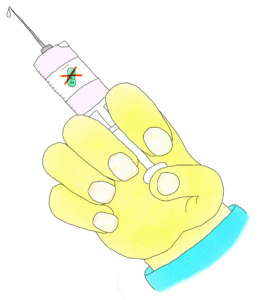
I know that it is not a nice feeling to get pricked by a needle. But it is way better than getting ill from some nasty germ that can harm you.
Your friendly bacteria
Finally, I also would like to mention the many good bacteria living in your gut and on your skin that also help you. They work on preventing bad germs (mostly other bacteria and fungi) from taking hold over your body.
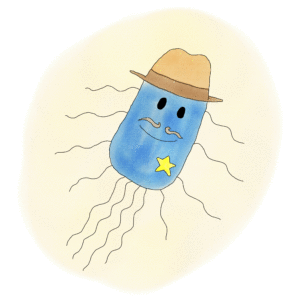
Howdy stranger! That’s my job!
But what do you do, if you already have been infected by germs?
Thankfully, there still are options, if all measures for germ prevention fail and you do get sick from these little critters. If you get infected by bacteria, your doctor will prescribe so-called antibiotics, which can kill off bacteria.
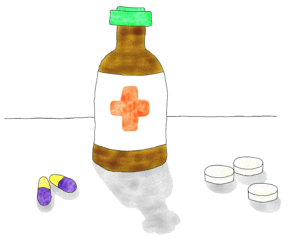
Antibiotics will not work against harmful viruses, fungi or protozoa. However, there are other drugs, and medicines in the form of pills, syrups or salves that can be described by your doctor and will help you. They will either attack the germs directly or help to activate your immune system to intensify its fight against the harmful critters. What kind of treatment you receive will specifically depend on the kind of infection you have.
